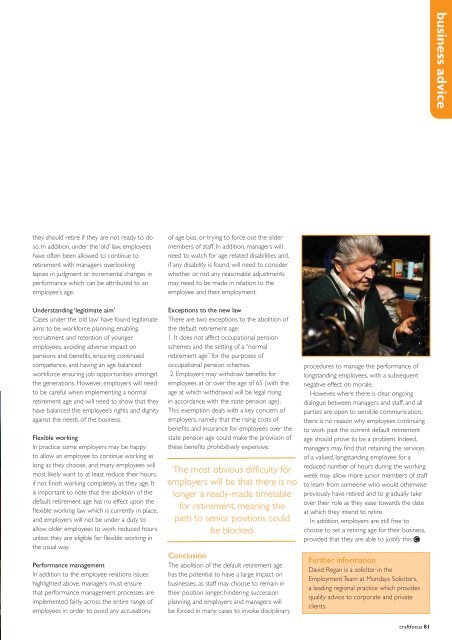business advice - Craft Focus Magazine
business advice - Craft Focus Magazine
business advice - Craft Focus Magazine
You also want an ePaper? Increase the reach of your titles
YUMPU automatically turns print PDFs into web optimized ePapers that Google loves.
usiness <strong>advice</strong><br />
they should retire if they are not ready to do<br />
so. In addition, under the ‘old’ law, employees<br />
have often been allowed to continue to<br />
retirement with managers overlooking<br />
lapses in judgment or incremental changes in<br />
performance which can be attributed to an<br />
employee’s age.<br />
Understanding ‘legitimate aim’<br />
Cases under the ‘old law’ have found legitimate<br />
aims to be workforce planning, enabling<br />
recruitment and retention of younger<br />
employees, avoiding adverse impact on<br />
pensions and benefits, ensuring continued<br />
competence, and having an age balanced<br />
workforce ensuring job opportunities amongst<br />
the generations. However, employers will need<br />
to be careful when implementing a normal<br />
retirement age and will need to show that they<br />
have balanced the employee’s rights and dignity<br />
against the needs of the <strong>business</strong>.<br />
Flexible working<br />
In practice some employers may be happy<br />
to allow an employee to continue working as<br />
long as they choose, and many employees will<br />
most likely want to at least reduce their hours,<br />
if not finish working completely, as they age. It<br />
is important to note that the abolition of the<br />
default retirement age has no effect upon the<br />
flexible working law which is currently in place,<br />
and employers will not be under a duty to<br />
allow older employees to work reduced hours<br />
unless they are eligible for flexible working in<br />
the usual way.<br />
Performance management<br />
In addition to the employee relations issues<br />
highlighted above, managers must ensure<br />
that performance management processes are<br />
implemented fairly across the entire range of<br />
employees in order to avoid any accusations<br />
of age bias, or trying to force out the older<br />
members of staff. In addition, managers will<br />
need to watch for age related disabilities and,<br />
if any disability is found, will need to consider<br />
whether or not any reasonable adjustments<br />
may need to be made in relation to the<br />
employee and their employment.<br />
Exceptions to the new law<br />
There are two exceptions to the abolition of<br />
the default retirement age:<br />
1. It does not affect occupational pension<br />
schemes and the setting of a “normal<br />
retirement age” for the purposes of<br />
occupational pension schemes.<br />
2. Employers may withdraw benefits for<br />
employees at or over the age of 65 (with the<br />
age at which withdrawal will be legal rising<br />
in accordance with the state pension age).<br />
This exemption deals with a key concern of<br />
employers, namely that the rising costs of<br />
benefits and insurance for employees over the<br />
state pension age could make the provision of<br />
these benefits prohibitively expensive.<br />
The most obvious difficulty for<br />
employers will be that there is no<br />
longer a ready-made timetable<br />
for retirement, meaning the<br />
path to senior positions could<br />
be blocked.<br />
Conclusion<br />
The abolition of the default retirement age<br />
has the potential to have a large impact on<br />
<strong>business</strong>es, as staff may choose to remain in<br />
their position longer, hindering succession<br />
planning, and employers and managers will<br />
be forced in many cases to invoke disciplinary<br />
procedures to manage the performance of<br />
longstanding employees, with a subsequent<br />
negative effect on morale.<br />
However, where there is clear ongoing<br />
dialogue between managers and staff, and all<br />
parties are open to sensible communication,<br />
there is no reason why employees continuing<br />
to work past the current default retirement<br />
age should prove to be a problem. Indeed,<br />
managers may find that retaining the services<br />
of a valued, longstanding employee for a<br />
reduced number of hours during the working<br />
week may allow more junior members of staff<br />
to learn from someone who would otherwise<br />
previously have retired and to gradually take<br />
over their role as they ease towards the date<br />
at which they intend to retire.<br />
In addition, employers are still free to<br />
choose to set a retiring age for their <strong>business</strong>,<br />
provided that they are able to justify this. C<br />
Further information<br />
David Regan is a solicitor in the<br />
Employment Team at Mundays Solicitors,<br />
a leading regional practice which provides<br />
quality <strong>advice</strong> to corporate and private<br />
clients.<br />
craftfocus 81
















